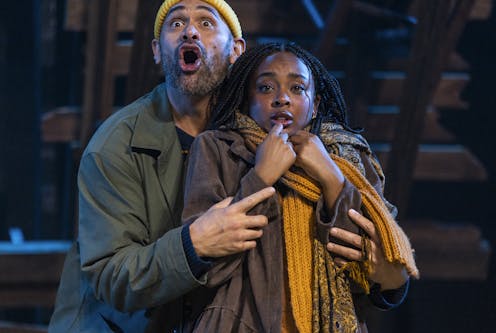Bell Shakespeare’s A Midsummer Night’s Dream is side-splittingly funny – yet some of the magic is lost
- Written by Kirk Dodd, Lecturer in English and Writing, University of Sydney

Shakespeare’s delightful A Midsummer Night’s Dream is a perennial favourite – and the production run by the Bell Shakespeare company (first prepared in 2021 but hindered by COVID lockdowns) is a swift and pared-back reimaginingreimagining of the play.
It follows the comedy of four lovers – Hermia, Lysander, Helena and Demetrius – who are lost in a forest and get tricked by the fairies, King Oberon, Queen Titania and the impish Puck.
The play also features the bumbling mechanicals – a carpenter, a weaver, a bellows-mender, a tinker, a joiner and a tailor – who meet in the forest to rehearse a play to perform at the upcoming wedding of the Duke and Duchess of Athens, Theseus and Hippolyta.
This play within a play, performed at the end, has always brought the house down with sidesplitting laughter, and this show is no exception. It must have been just as hilarious during the play’s first performance, if it’s true that Shakespeare wrote it to be performed at an aristocrat’s wedding.
Finally, Shakespeare for the whole family
Bell Shakespeare promotes the show as “fast, funny and family-friendly”. This is welcome news for theatregoing parents. Few of Shakespeare’s plays are suitable for children, despite there being a significant market for Shakespeare-related books and activities designed for young people.
My two boys received a storybook version of Shakespeare’s plays from family members some years ago, but it’s a delicate operation to tell bedtime stories about the fratricide in Hamlet, the domestic violence of Othello, or the romantic suicides of Romeo and Juliet.
Certainly, Shakespeare’s delightful comedies lend themselves more readily to the young. So taking Bell Shakespeare’s promo at its word, I took my son Heathcliff, aged 9 (who contributes to this review) to the show.
Powerful presence onstage
Seasoned playgoers will be thoroughly impressed by the vibrant and engaging performances of the cast, who make Shakespeare’s language (and their connections to it) ring as clear as a bell. This is harder to achieve than it sounds.
The delightful charisma of Matu Ngaropo as Nick Bottom (the weaver) positions him as a type of leading man. A galvanising force, Ngaropo combines refined flamboyancy and outrageous sensitivity to keep the audience firmly in his pocket.
Ella Prince is subtle in their rendering of Puck, the sprightly spirit – so watchable in their intriguing silences and confusion when manipulating mortals.
Richard Pyros gives a commanding performance as Oberon: fastidious and curious, with a propensity for bellowing through the forest. Imogen Sage also shows tremendous range by delivering a sultry Titania, a restrained Hippolyta, and a librarian-esque Quince.
Finally, the four comic lovers: Hermia (Ahunim Abebe), Helena (Isabel Burton), Demetrius (Mike Howlett) and Lysander (Laurence Young), give feisty performances wholly committed to the verse.
A subtle set and costumes
This is Bell’s national touring play for 2024, and the set design by Teresa Negroponte centres around a dilapidated wooden construct that looks like the roof of an old barn tipped on its side.
But despite this dynamic set (which might double as the shipwreck from The Tempest), there are no leaves or any sort of greenery to help indicate most of the play is set in a forest – no sylvan milieu.
Indeed, this production seems, in several instances, to presuppose the audience’s familiarity with the play. This can prove confusing for newcomers to Shakespeare.
The costumes are intriguing and subtle if you know the play, but may also be too realistic – too bland and “everyday”. This made it difficult for young people to recognise the kings, queens and fairies.
For example, there was nothing fairylike about the fairies, whose costumes were almost always plain black, with no hint of glitter or sparkles in sight.
As Heathcliff commented: “They all changed into black clothes and called themselves fairies […] I didn’t know they were meant to be fairies until the second half […] they looked more like ghosts.”
“Thou shall wear not black costumes for fairies,” he added.
With actors needing to double (and sometimes triple) character roles, they quickly don a new coat, scarf or hat. But again, these distinctions may be too subtle for newcomers to recognise.
Heathcliff’s highlights
While the acting proved second-to-none, many typical features of this famous play were absent. Heathcliff found the play “entertaining, but not laugh-out-loud funny”.
His favourite parts were the “horse’s head”, the slow-motion sequences, the fake swords used in the ridiculous staging of Pyramus and Thisbe at the play’s end, and “the man playing the princess” (with hairy chest exposed) – which he thought was funny but a bit odd.
Yet, the performance of Pyramus and Thisbe at the end delivered on its promise. Many of the audience members doubled over in stitches, throwing their heads back with laughter.
I’ll remember this show for the many exemplary renditions of the famous characters, but while Shakespeare’s script is itself family-friendly, the play can be confusing when many of its typical features are pared back to the bone.
Read more: Friday essay: 50 shades of Shakespeare - how the Bard sexed things up
Authors: Kirk Dodd, Lecturer in English and Writing, University of Sydney





